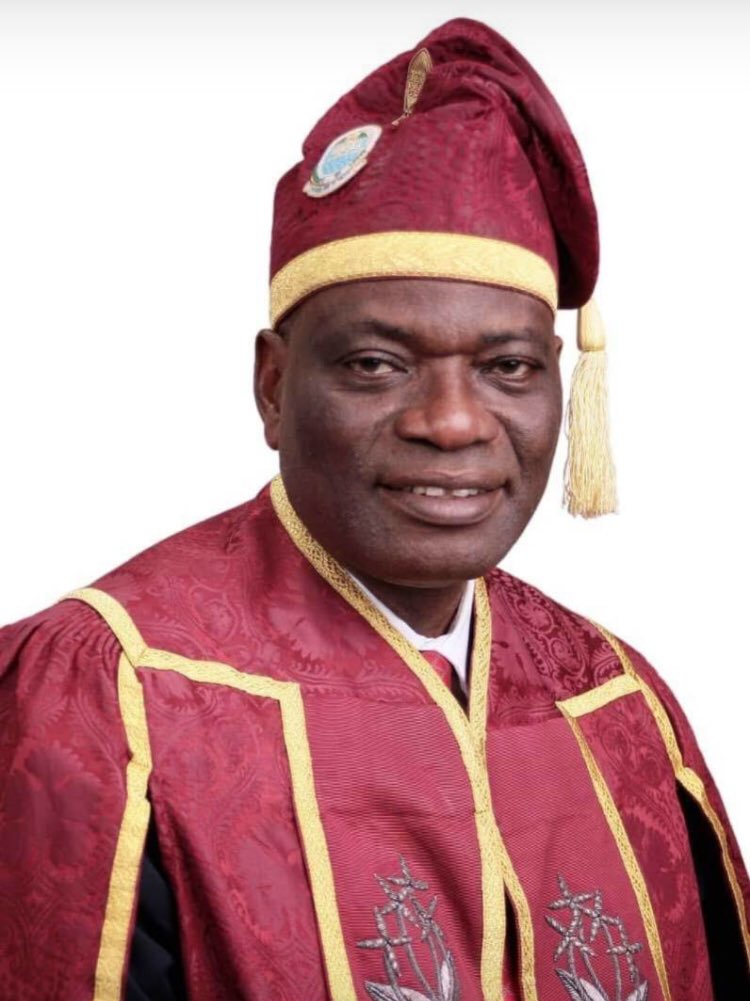By Martins Oloja
In Chukwu, et al’s Oluwatoyin Temitayo Ogundipe @ 60: Audacity of Resilience, a young man embarks on a journey of self-discovery with surprising results. In the compendium of 340 pages, edited by some scholars ably lead by the University of Lagos Deputy Vice Chancellor (Management Services), Professor L.O. Chukwu, there is a story. In the anthology to mark the Diamond Jubilee of Professor Oluwatoyin Temitayo Ogundipe, ‘OTO’ as he is fondly called, you will read a lot of remarkable things about the 12th Vice Chancellor of the University of Lagos. The editors of the book say they are celebrating the scholar’s success, audacity, and resilience ‘even in the face of a dark cloud’.
Specifically, his friends, colleagues and co-workers in this book are celebrating what they have described as the scholar’s interesting and significant life, which centres on four pillars: His romance with nature and family life; his research orientation; his university leadership and administration and his relationship with God. In the book, the authors who prefer to be called editors, tackle the subject of success – how people obtain it and what contributes to extraordinary success of the icon they are celebrating as opposed to everyday success.
The book takes you through OTO’s fulfilled mission and vision for what they would like to call the University of First Choice, (University of Lagos) and the Nation’s Pride as the chief executive officer. You will enjoy a chronicle of a significant life of a retired soldier’s son who may not have been prominent in the media, but quite significant as Rick Warren, author of a classic, The Purpose Driven Life would have described him. Recall Warren’s subset in the book that some people are prominent but not significant just as some people are significant but not prominent. The cleric avers that God the Almighty is interested in significant people who may not be prominent, after all.
The voluminous book takes you through the humble origin of the quiet operator OTO till he rose through the academic rank to the 11th floor of the Senate as the 12th Vice Chancellor of the University students and teachers fought tooth and nail to retain its brand equity as the University of Lagos, when the Federal Government actually renamed it Moshood Abiola University (MAU) in May 2012. The Mau-Mau trouble was so much that on February 20, 2013, the decision was reversed by President Goodluck Jonathan, thanks to the power of non-violent resistance – to retain a brand name and reputation.
In the odyssey on the life and times of their hero, the foreword writer, the Governor of Lagos State, Babajide Sanwo-Olu calls a ‘progressive in the ivory tower’, there are so many leadership lessons and principles they would like readers to imbibe. One of the lessons is that success isn’t often guaranteed and so there are always several failed efforts behind every accomplishment. In fact, Governor Sanwo-Olu says in the foreword that, ‘…that is the most important lesson from this book.
The audacity of Toyin’s resilience is quite remarkable in a way. The simple man who set out to study Pharmacy at the University of Ife (Now Obafemi Awolowo, University, Ile-Ife) was offered admission to study Botany, a course he actually did not apply to study. He attempted to change to Pharmacy in year two, but at the 11th hour, the Professor who was to facilitate the change died. Again, as a year three student, he had written a business plan on haulage, logistics, suppliers, landscaping, and importation having learnt commerce from his mother. He also was to go into supply and importation business, but he also had to abandon that line of business.
Thus, the story of the life of Professor Ogundipe from personal to the career perspectives, is told in the book as one of the epic stories of this decade. The story chronicles his birth and career trajectory as ‘foretold’ by his lecturer, who was not a prophet by calling during his undergraduate programme. The lecturer had looked into the seeds of time and declared that Temitope would be a lecturer. You would see in the publication that his prayer warrior aunt also nurtured him spiritually.
The story you are about to read is a mixed but balanced grill because it does not conceal Ogundipe’s failings – as a young boy. You would read that he had his excesses. Even as an undergraduate student, he was nonchalant toward his studies, despite the ‘prophesy’. Notwithstanding, you will see in this didactic story how it came to pass that Toyin attained professorship, the late Professor Frank Ugboajah, of the Department of Mass Communication once called ‘the world’s highest distinction’.
Sooner or later, you will read in the book that when OTO decided to become an academic, he first submitted his application to another university, outside Akoka. But fate blew him to the University of Lagos. He got appointment in 1990 as a Lecturer I instead of Lecturer II (he was qualified to be with his PhD, at the same University of Lagos) he has steadily risen through the ranks to become a full Professor in 2002. The man who wanted to be a pharmacology scholar has been a scholar in the field of Botany and his researches cut across Molecular Plant Taxonomy/Biosystematics, Forensic Botany, Cytogenetics, Ethnobotany, Paleobotany and Ecological Conservation, with numerous publications in accredited local and international academic journals. As an academic as you will read in this anthology that OTO who became a full Professor in 2002 had served as Head of Department of Botany, Sub-dean of the Faculty of Science, Dean, School of Postgraduate Studies, Director of Academic Programmes (DAP) and Deputy Vice Chancellor (Academics and Research) before becoming the 12th Vice Chancellor of the University of Lagos on 12th November 2017.
Titled Oluwatoyin Temitope Ogundipe @ 60: Audacity of Resilience, the book is edited by academics namely: Chukwu, Lucian Obinna, Falaiye Muyiwa; Ogwezzy-Ndisika, Abigail, Onuminya, and Olabisi Temitope. Published in 2021 by the UNILAG Press and Bookshop Ltd, it has five parts, 16 chapters and 340 pages. This festschrift (a volume of writings by different authors presented as a tribute or memorial, especially to a scholar) celebrates the life and achievements of the 12th vice chancellor of University of Lagos.
You will read in this subset another background of OTO: Having learned the rudiments of scientific research through his undergraduate project, Ogundipe went on to serve his motherland and gave back to the society by serving as Senior Science Teacher under the Rivers State Teaching Service Commission, between 1984 and 1985. The experience instilled in him the desire to make academics his career. Thereafter, Oluwatoyin was admitted to read for a Masters degree in Botany at the University of Ife where he investigated the vegetative anatomy of the Nigerian species of Echnochloa P. Beauv—a common grass in Nigeria.
His success at the Masters level spurred him to pursue a doctorate in the same subject and at the same school between 1986 and 1990. For ‘Plants in the service of Man’ in Chapter 6, the Director, Institute of African and Diaspora Studies, University of Lagos, Prof. Muyiwa Falaiye chronicled how the protagonist showed his love for plants from his early life to the extent that he wasn’t surprised he would devote his entire academic career to the study of plants, becoming a professor and eventually the vice chancellor of the University.
According to the erstwhile university chancellor whose tenure was more turbulent than that of Ogundipe, a vice chancellor must possess a good university education. He/she must be a distinguished scholar with the rank of professor. He must have served with a minimum of five to 10 years as a leader in an established institution. “He must be a person of proven integrity; be not more than 65 years old as at the date of possible assumption of duty.”
Moreover, what Nigerian universities need most are excellence centres to collate worldwide research, not research itself because Nigerians neither have the finance nor the ingenuity to conduct worthwhile research in the modern world. Israel with a population of 9.4 million people boasts of 14 Nobel laureates, while Nigeria with 200 million people has only one Nobel Prize winner. We must reflect on this data and where the rains have beaten us so badly!
‘This Is Not The Whole Book’
Although, the work to celebrate OTO @ 60 tells the story of the diligent Toyin, a quiet operator, a humble city boy, who got his first significant lesson in humility from his mother, who early in life taught him that, ‘humility will bring lots of benefits to you but pride will take everything from you, it is still not the book on (the) ‘Audacity of Resilience’. May be that is why the editors of the work didn’t use a definite article ‘the’ as a former president Barack Obama did when he wrote his second book, The Audacity of Hope.
The book truly celebrates OTO @ 60 with so many seminal articles on the leadership and management styles of the quintessential scientist. There are so many modern lessons from the articles in honour of the Vice Chancellor. But the story of resilience that has been told, reconstructed and deconstructed on some titanic battles with authorities of the University in focus, in the mainstream media, didn’t receive enough treatment in the compendium. Even those who paid tributes to the iconic scholar in the book didn’t give dark hints on what would have thrilled readers about the many probes he (Ogundipe) reportedly survived as part of lessons to be learnt in crisis management.
Many contributors including Professors Chukwu and Ogwezzy-Ndisika only used innuendos on the crisis that hit the fan at the University. One of the crises led to even the suspension of the celebrant and cancellation of unarguably the most important ceremony in a university, a convocation. They didn’t reconstruct the story, which many newspapers including The Guardian commented on. I think the story should have been treated to contextualise the ‘audacity of resilience’ curiosities raised in the preface and acknowledgement of the book.
That is why I feel that this is ‘a book’ on OTO @ 60. I believe ‘the book’ is a work in progress, which should be presented sooner than later. That I think should give us more pieces of evidence of resilience – from this significant scientist. But that minor lacuna doesn’t take any steam away from the quality of the book, in the main. It is a well-written and well-edited piece of work from Chukwu, et al. I recommend it to those who are interested in leadership positions in the academia, politics and business. You will find it a useful tool at this time that leadership and management issues have become a conversation of some sort, thanks to the digital age that has disrupted all the curricula of studies and old strategies. Pick your own copy of the book, today because it is remarkable.
Being a slightly edited review of Oluwatoyin Temitayo Ogundipe at 60: Audacity of Resilience’ By Martins Oloja, MD/EiC, TheGuardian on January 25, 2022, at the J.F Ade Ajayi Auditorium, University of Lagos, Akoka, Lagos.





